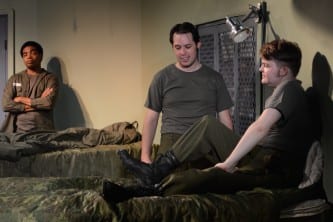
Kwame Lilly as Rodger Kyle Lester as Billy John F. Rutherford as Ritchie Photo by Brooke Viegut
It’s pretty early but Jason Leyva is already up and upbeat — probably more so than he should be. Last night was the first preview of his latest production, and in a few hours it’s opening night. No one would blame him for being nervous, but he’s not.
“I just got all the blood out of the army uniforms and got a fresh pot of coffee on —let’s get it done!” he says during a phone interview.
That kind of energy is all the more surprising considering the topic of the play Leyva is producing through his L.I.P. Service Productions: David Rabe’s controversial Vietnam-set play Streamers. One of the defining plays of the 1970s, it’s set in an Army barracks in 1965, as a handful of soldiers — of different races, religions and sexual orientations — prepare to ship out overseas. Not all of them will make it.
It’s a good fit for Leyva, who says a high school drama teacher set him on his off-the-beaten-path theater track.
“Streamers was one of the first plays I ever said that dealt with race, religion, [sexuality],” he says. “It’s also the first place I saw blood and nudity onstage. There were issues being dealt with that were more truthful than the standard boy-meets-girl.”
It certainly is not. When one of the soldiers admits to the others that he’s gay, the way they deal with the news leads to violence and tragedy. But the play was written in 1976, and set in 1965, and not produced in 2015 — it’s a period piece that has become a period piece. Stonewall hadn’t yet occurred in the time of the play; it was recent news in 1976. So how does the show resonate in a post-marriage-equality, post-Vietnam America?
“As we have moved through this piece, it is amazing that these issues are just as prevalent,” Leyva says. The difference, he says, is not the feelings, that that now “the discussions have opened up. It’s not that we are more or less accepting, but more that we are [more direct] in the discussions of these topics. And as we discuss them more, we realize how they are still at the top tier of what tends to divide us as a society.”
It’s been a year since Leyva and his team first decided to produce Streamers; at the time Ferguson was in the news, and issues of violence and equality (racial, sexual) were in the news. Now, as the show prepares to open, the same issues still resonate.
“Here we are, a year later, and all of these same things — really, acceptance of each other — are bubbling to the forefront of the American discussion still,” Leyva says. But ultimately, he says, the problems we have as a society are largely internal. “It has really never gone away. We continue to debate equality, not only in others but in ourselves. What we have really developed is a kind of aggressive blame — we wanna put something on everyone else so we don’t accept our own faults. We hide behind this mirror of ‘it’s your fault not mine.’ It brings to the forefront that we tend to push away whether than closer together. The three gentlemen in Streamers are going to war together and need to create a bond, but continue to fracture it by their own inability to put aside their differences. The beautiful thing about this play is that the enemy is buried right inside of them, but hidden behind this façade of a far-away war. It’s a heartbreaking story of our inability to communicate.”
Streamers opens tonight at the Firehouse Theatre, 2535 Valley View Lane, Farmers Branch. Runs through Aug. 29.













